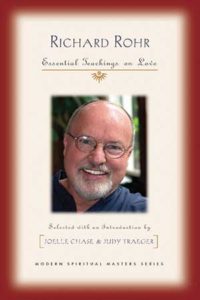Richard Rohr: Essential Teachings on Love
Reviewed by Rob Pierson
August 1, 2019
By Richard Rohr, edited by Joelle Chase and Judy Traeger. Orbis Books, 2018. 288 pages. $22/paperback; $18.50/eBook.
In the classic Quaker movie Friendly Persuasion, a young boy pops up in meeting for worship to blurt out “God is love!” and promptly sits back down. It’s a cute scene. The father smiles. The rather dour elder on the facing bench does not. Reading Richard Rohr: Essential Teachings on Love left me thinking about that boy, reflecting on Quakers past and present, and wondering why we speak so often of Light and so seldom of Love.
The overriding themes of Rohr’s theology are very simple: God is love; we are created in God’s image; and Jesus commanded that we be what we already are. The problem, as Rohr says, is “it’s so simple that it’s hard to teach.”
Sometimes, our lives teach. This book reminds me of a Quaker journal in that respect. The editors, Joelle Chase and Judy Traeger, evoke Rohr’s message by interweaving bits of his journey in the form of short biographical sketches followed by related writings.
Born in Kansas in 1943 to Catholic parents, Rohr felt called to priesthood as a boy, was trained and ordained as a Franciscan friar, and experienced extraordinary success leading the New Jerusalem Community that thrived in the 1970s. In his presence, young adults experienced the presence of God, lived in community, and spoke in tongues.
But Rohr found himself in spiritual crisis, felt himself a fake, sheltered, privileged, and in danger of his leadership at New Jerusalem becoming an idol for the community. For him, the second half of life started “when [he] got in [his] little blue pickup truck and moved to Albuquerque in August of 1986.”
Now here’s the irony: I lived around the corner from Rohr but never knew it. As so often happens with spiritual odysseys, it took me going to Quaker seminary across the country to discover Rohr’s Center for Action and Contemplation (CAC) in my own backyard. I might have saved a journey by going to his Living School, which seeks to form people whose lives are models of love—or in Quaker jargon, people whose lives speak.
The most important word in our Center’s name is not Action nor is it Contemplation, but the word and. We need both action and contemplation to have a whole spiritual journey. It doesn’t matter which comes first; action may lead you to contemplation and contemplation may lead you to action. But finally, they need and feed each other.
This seems to me a word we need to hear as Quakers, and Rohr, despite being a Catholic Trinitarian, can sometimes wax quite Quakerly. He calls for an experience-based faith, for speaking truth, living simply, and staying close to the marginalized and to the rest of creation. He has a strong sense of the inward teacher and reminds us that the same section of John’s Gospel that commands us to love one another is the one where we are first called Friends. “To love God means to love everything . . . no exceptions,” he writes.
At the heart of his message is the Quaker boy’s testimony: “Whoever does not love does not know God, for God is love” (1 John 4:8). Sadly and ironically, asserting divine love generates plenty of hate mail. Some attack Rohr as a lost soul and a blasphemous heretic. Yet, when the Vatican sent questions, his answers raised no objections. God is love. This is crazy talk, yes . . . but it’s gospel crazy talk. “We were created by a loving God to be love in the world.”
I’ve met many Friends who subscribe to Rohr’s daily meditations (cac.org). They say his writing is “expansive” and “inclusive,” much “bigger than the Quaker box.” Rohr’s Christ is big enough to embrace all faith traditions. For Rohr, our need to know that we are right also drives our tendency to exclude. He writes, “God did not say ‘Be right’; God said ‘Be in love.’”
For those who already treasure Rohr’s writings, this book weaves together bits of his life and words in ways that illuminate both. For those who’ve never heard of Rohr, it serves as an introduction.
“Love was the first motion,” writes John Woolman. “Our life is love,” says Isaac Penington. It’s an old message, even among Friends, but one we often need to rehear. If we are called to be patterns and examples in the world, per George Fox, then patterns and examples of what exactly? Of being right? Or of being love?
1 thought on “Richard Rohr: Essential Teachings on Love”
Leave a Reply
Comments on Friendsjournal.org may be used in the Forum of the print magazine and may be edited for length and clarity.




Beautiful. Thank you!